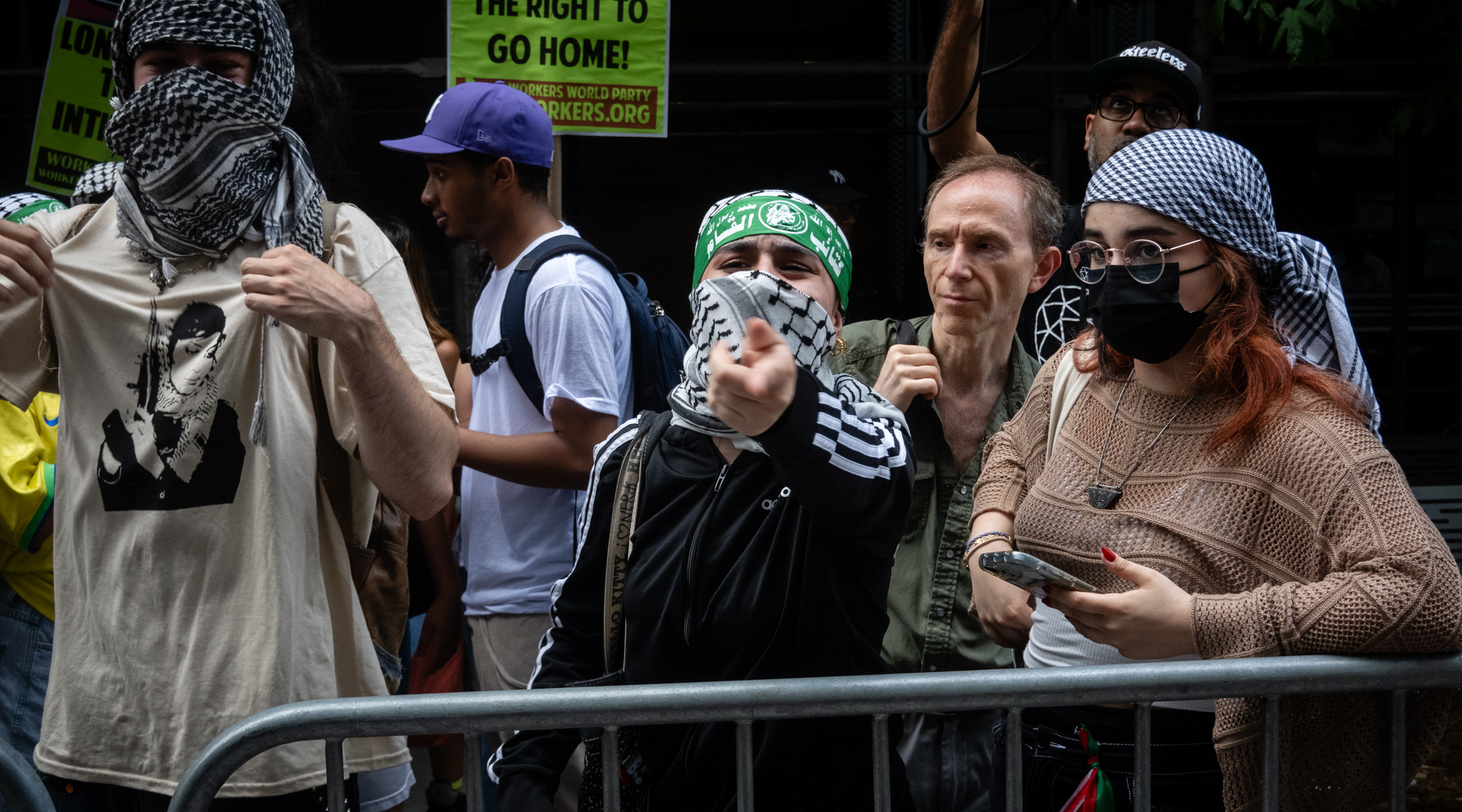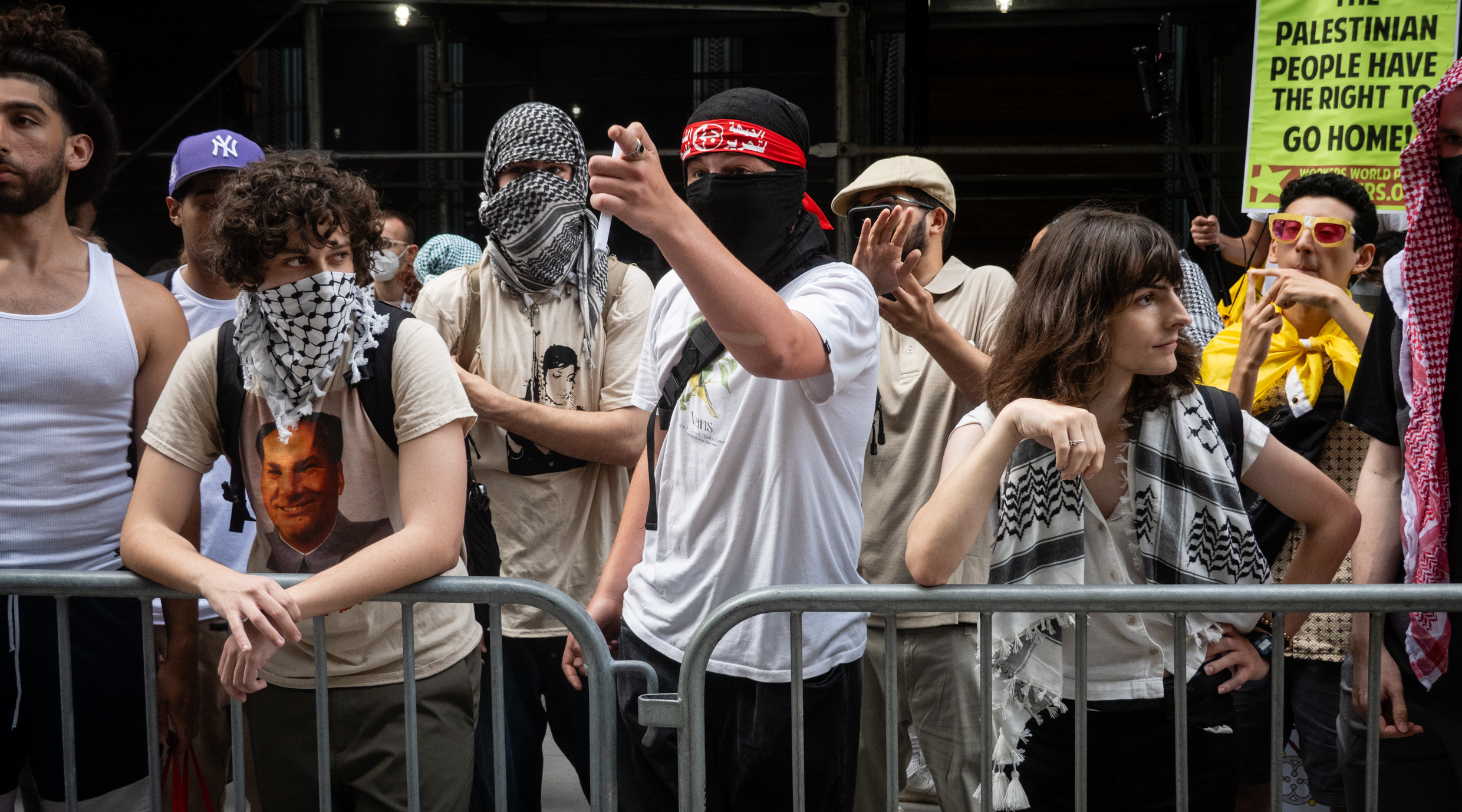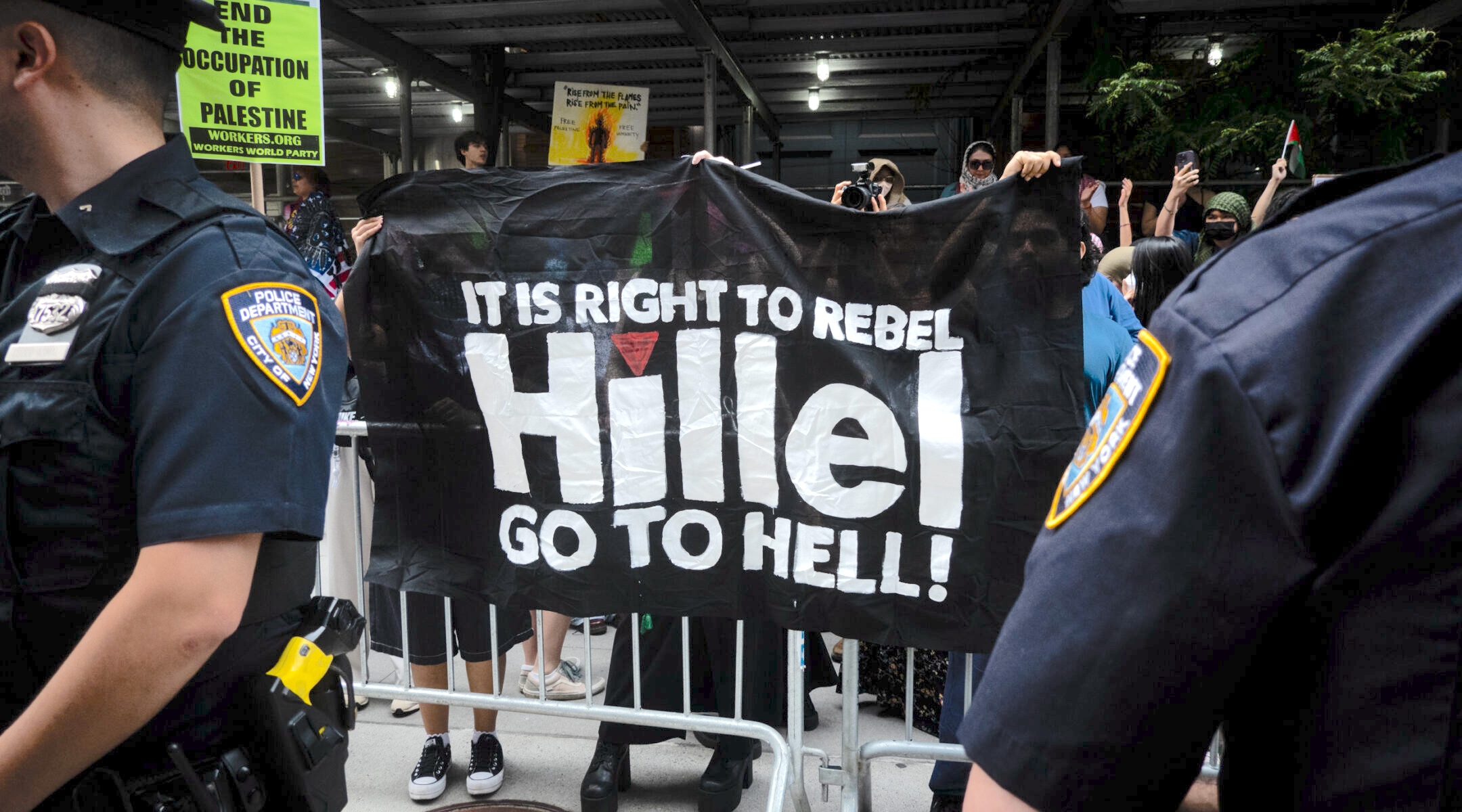Pro-Palestinian student groups at Baruch College staged a protest against the school’s Hillel on Wednesday, accusing the Jewish campus group of murdering children and supporting fascism and genocide.
The demonstration — in which protesters scuffled with pro-Israel counterprotesters and were arrested — appeared to be the first across the City University of New York system that directly targeted Hillel, which has historically served as the main address for Jewish student life and ritual.
It’s one of a growing number of pro-Palestinian actions at universities across the country to target campus Hillel chapters. It comes after a Hillel event at Baruch was canceled due to protests last month.
While pro-Palestinian students have organized in large numbers over the past academic year to oppose Israel’s war against Hamas in Gaza — and while many of those activists have criticized Hillel for supporting Israel — protests focused on Hillel itself are rare. But on Wednesday afternoon, several dozen protesters gathered for a “Rally against Hillel” in front of the building that houses Baruch’s Hillel and Chabad club in Gramercy Park. A similar number of counter-protesters showed up as well.
The rationale for the protest — according to an Instagram flyer that also said “HILLEL STANDS WITH GENOCIDE” — was a recent trip to an Israeli army base that Hillel organized for students. The Baruch Hillel serves students at eight schools in Manhattan.
“With material support from Hillel International, Hillel at Baruch … visited occupied Palestine to feed and dress as IOF soldiers,” read the Instagram post, using a pejorative acronym standing for Israel Occupation Forces (rather than Israel Defense Forces). “We demand CUNY ends all partnership with Hillel International for its direct complicity in the Gaza genocide.”
Another post advertising the event said, “No fascists on campus.”
The protesters carried a banner that said “It is right to rebel, Hillel go to hell,” with an inverted red triangle on it, which has come to signify support for Hamas on social media because the terror group uses the symbol in videos of its attacks. The student demonstrators repeatedly formed inverted triangles with their hands, flashing the symbol at the counter-protesters. Another protester brandished a banner that had a swastika inside a Star of David while shouting, “Synagogue of Satan.”

A protester wearing a Hamas headband gestures toward pro-Israel counter-protesters at Baruch College in New York City, June 6, 2024. (Luke Tress)
The pro-Palestinian demonstrators chanted “From CUNY to Gaza, globalize the intifada,” and “Hillel, Hillel, what do you say? How many kids did you kill today?” Another protester wore a shirt bearing the image of Leila Khaled, a Palestinian who gained notoriety for hijacking airplanes in 1969 and 1970. Two protesters wore green headbands used by Hamas armed wing, and a leader of the group wore a headband used by the Popular Front for the Liberation of Palestine, another U.S.-designated terror group.
About a dozen police separated the pro-Palestinian protesters from the pro-Israel side, which chanted “Am Yisrael Chai,” Hebrew for “the people of Israel live,” and sang the Israeli and American national anthems.
Early in the demonstration, scuffles broke out on the sidelines of the rally, and the police handcuffed a pro-Israel demonstrator wearing a sticker on his shirt that said “Hamas=ISIS.” Minutes later, one of the leaders of the pro-Palestinian group was taken away by police. Police officers then brought in additional metal barricades to further separate the two groups. The NYPD arrested nine people across both groups and released eight with summons. Most of the arrests appeared to have taken place after the pro-Palestinian group set off on a march, leaving the pro-Israel group behind.
The pro-Palestinian protesters at Baruch appeared to be mostly college-age, but it wasn’t clear how many were Baruch students. Most wore keffiyehs, or Palestinian scarves, that covered their faces. The pro-Israel side included both college-age and older adults.
The protest was organized by pro-Palestinian student groups, including Baruch’s Students for Justice in Palestine and Muslim Student Association. In response to an inquiry ahead of the protest, Baruch condemned it but noted that the protest site, in a campus plaza, was public property. The school did not respond to questions about whether official clubs were allowed to target other student groups.
“Baruch supports the right of all individuals and groups to express their views peacefully and respectfully, but we condemn the tenor of this rally because it is counter to Baruch’s value of mutual respect, essential to learning and working in a diverse community like ours,” Baruch said in a statement.

A protester wearing the headband of the PFLP terror group at Baruch College in New York City, June 6, 2024. (Luke Tress)
Hillel at Baruch declined to comment, but a Jewish faculty group condemned the protesty as antisemitic. The group’s statement echoed critics of other attempts to push out Hillels, who say that because Hillel is primarily a space for Jewish gathering, community and religious ritual, such actions are an attack on campus Jewish student life.
The Jewish faculty group, called the CUNY Alliance for Inclusion, said in a statement that the rally’s “flier and stated agenda are unambiguously antisemitic,” and condemned Baruch for allowing the protest.
“This so-called protest is no protest at all – it is an attack on Hillel and an effort to isolate Jewish students and stifle their voices,” the group said.
Other Pro-Palestinian student groups in New York City have also embraced support for terror groups in recent weeks. Columbia University’s branch of Students for Justice in Palestine has posted messages to Instagram and Telegram claiming that Hamas is not antisemitic and using the upside-down triangle. One post, referring to Hamas’ principal mode of attack, read, “Whoever is in solidarity with our corpses but not our rockets is a hypocrite and not one of us.”
Also Wednesday, pro-Palestinian demonstrators held a separate protest against the Weill Cornell Medicine center in the Upper East Side. They called to “flood Cornell,” using a term commonly employed by protest groups that echoes Hamas’ name for the Oct. 7 attack on Israel, the “Al-Aqsa Flood.”
The New York Jewish Week brings you the stories behind the headlines, keeping you connected to Jewish life in New York. Help sustain the reporting you trust by donating today.





